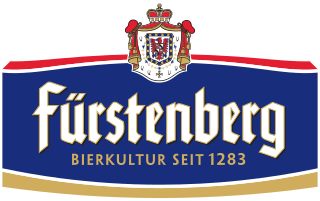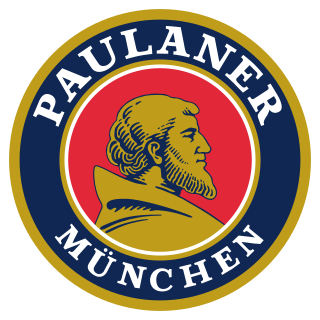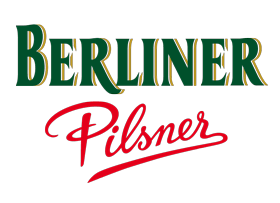
Holsten Brewery is a brewing company founded in 1879 in what is now Hamburg's Altona-Nord quarter. The group now has seven breweries in Germany. Its nationally distributed premium brand is the pale lager Holsten Pilsener. The company was acquired by the Carlsberg Group in 2004.

Henninger Brewery was a notable brewery in Frankfurt, Germany. The Henninger brewery in Frankfurt traces its roots to 1655 in Eberhard Stein's brew house. In 1873 Heinrich Christian Henninger, who came from Erlangen/Bavaria, entered the brewery. In 1881 it was transformed into a stock company and changed its name into "Frankfurter Bierbrauer-Gesellschaft - vormals Henninger und Söhne". After several expansions and acquisitions it changed its name again in 1935 to its final name Henninger-Bräu AG.

Spaten-Franziskaner-Bräu GmbH is a brewery in Munich, Bavaria, Germany. It produces Spaten and Franziskaner beers.

The Fürstenberg Brewery is a brewery located in Donaueschingen, Germany. It has been a subsidiary of Brau Holding International since 2005, before which it was owned by the House of Fürstenberg, a German noble family. Among other offerings, the brewery produces pilsner, export, and wheat beer, primarily serving southern Germany.

The Köstritzer brewery is one of the oldest producers of Schwarzbier in Germany. It is in Bad Köstritz, close to Gera in Thuringia.

Paulaner is a German brewery, established in 1634 in Munich by the Paulaner Order of mendicant friars. Now owned by the Schörghuber family, it is one of the six breweries which provides beer for Oktoberfest. Paulaner ranks number six among Germany's best-selling beers.
Bavaria – St. Pauli Brewery was a German brewery founded in 1922 from the merger of Bavaria Brauerei AG and St. Pauli Actien-Brauerei in Hamburg. Its brands are now brewed by Holsten.

The Kulmbach Brewery Corporation was founded in 1895 under the name Reichelbräu in Kulmbach, a city in Upper Franconia, Bavaria, Germany.

Radeberger started in 1872 when the brewery was founded as Zum Bergkeller, in Radeberg, a town in the vicinity of Dresden. Radeberger ranks No. 9 among Germany's best selling beers.
Schwaben Bräu is a brewery owned by Dinkelacker-Schwaben Bräu GmbH und Co. KG and located in Stuttgart, Germany. The company owns the largest brewery in the German state of Baden-Württemberg.

The Ernst Barre Private Brewery is a brewery in the East Westphalian town of Lübbecke in the north-western German district of Minden-Lübbecke. It was founded by Ernst Johann Barre in 1842. Along with its immediate competitor, the Herforder Brauerei, it is one of the largest breweries in East Westphalia, and is thus of regional importance. The brewery is located at the southern end of the pass over the Wiehen Hills between Lübbecke and Hüllhorst, at the base of the Reineberg hill, and has been in the same family for generations.
Braugold Vertriebs GmbH & Co. KG was a brewery in Erfurt. It was one of the largest breweries in the state and was for a time the market leader in Thuringia.

Tucher is a brewery and beer brand based in Fürth and Nuremberg, Germany. It was founded in Nuremberg in 1672. It is owned by the Radeberger Group, a division of the Oetker Group.
Berliner-Kindl-Schultheiss-Brauerei GmbH is a brewery in Berlin, Germany, that produces Berliner Pilsner, Berliner Kindl, Schultheiss, and Berliner Bürgerbräu. Until 2004, it was part of the larger brewing company Brau & Brunnen, which was then purchased by Dr. August Oetker KG and integrated into the Radeberger Gruppe.
Radeberger Group is the largest brewery group in Germany. It is headquartered in Frankfurt am Main and produces beer at 16 different locations. With an approximate annual production volume of 13 million hectolitres, the group accounts for approximately 15% of German beer production.

Berliner Pilsner is a beer produced in Berlin, Germany, by Berliner-Kindl-Schultheiss-Brauerei, a division of the Radeberger Group.
Ur-Krostitzer is a brand of beer from Krostitz near Leipzig, Germany.

Lützschena-Stahmeln is an area in the north-west of the city of Leipzig, a few miles upriver on the White Elster in what is now known as 'former' East Germany. It is known as the place where the wool merchant Maximilian Speck von Sternburg worked on his model sheep farm and beer brewery, and is still known today for his namesake: Sternburg.

The Aldersbach brewery is a traditional medium-sized brewery in Aldersbach, Lower Bavaria, opened in the 13th century. It produces beer types such as Dunkel, Helles, and Pilsner, plus seasonal Bock and Pale lagers. In 2016, it won awards from the Bavarian Brewers Association and the Bavarian State Beer Exhibition.














